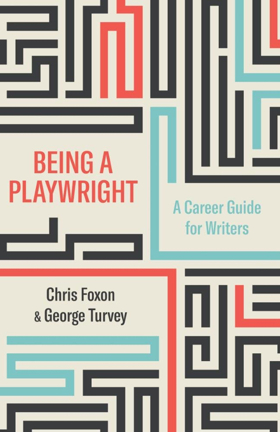Review: BEING A PLAYWRIGHT: A CAREER GUIDE FOR WRITERS, Chris Foxon & George Turvey
 How do you become a playwright? How do you behave as a playwright? When are you officially a playwright?
How do you become a playwright? How do you behave as a playwright? When are you officially a playwright?
Papatango's Chris Foxon and George Turvey answer all these questions and take on the immeasurable task of giving advice to budding playwrights in their first venture, Being a Playwright - A Career Guide for Writers.
Unlike many others, this is not a book on how to write a play. Instead, they take a person with a dream, a story, and ideally an already written script through the journey necessary to go from an idea to a first production, demonstrating how to lead a functional life as a writer.
They also disclose how to gain confidence in sharing a piece of writing, who to share it with, and reassure their readers that it's OK to fail.
"Be prepared to be bruised," they say, avoiding any sugarcoating in delineating how cruel this industry can be. At the same time they push playwrights to keep writing and keep trying, explaining that the theatre industry is too often very flawed and rejection is, unfortunately, unavoidable.
They point out how sometimes the reasons for failure are, however, the playwrights themselves by not believing in their own projects. "Don't let yourself be intimidated by the idea of being a playwright," they stress.
While they do briefly detail the process, format and structure to use when writing, their suggestions range from formal education to not being scared of saying 'no' to professionals, illustrating how theatre-making largely relies on planning and scheming.
They approach drawing a strategy with an insider's point of view, but manage to analyse the subject in a very hands-on and easy way, so that a novice won't find it too hard to understand how to promote and push themselves.
The book includes case studies and "Insider's View" pieces penned by the likes of Stewart Pringle, Tristan Bernays and Kristen Foster. The insertion of different voices gives more breath to it, brilliantly showing how united the playwriting front can be on different matters, and how doubts and insecurity are a shared experience.
They are also brutally honest while analysing issues from different angles. They explain what does and does not work when wanting to break into the business, but also warn their audience how to avoid coming off as a nuisance to professionals. Simultaneously, they give the tools (and psychological permission) to writers to be unafraid to demand what they're owed.
Paragraphs and chapters are straightforward and neat, void of any unnecessary divagation. This pragmatic nature is what raises this book from mere words to an effective guide that could make a difference in someone's life; for instance, the final, fruitful part of the book is solely dedicated to brief lists of organisations and institutions that could jump-start a career.
Essentially, if you've ever wanted to be a playwright, this book will either scare you off or give you the tools and hope you need. It will prepare you from your first draft to writing your opening night cards, because even though the sporadic reality of earning a living as a writer scares even the most successful ones, it doesn't mean it's not worth it.
Being a Playwright: A Career Guide for Writers is published by Nick Hern Books
Read an extract from the book here.
Reader Reviews
Videos

